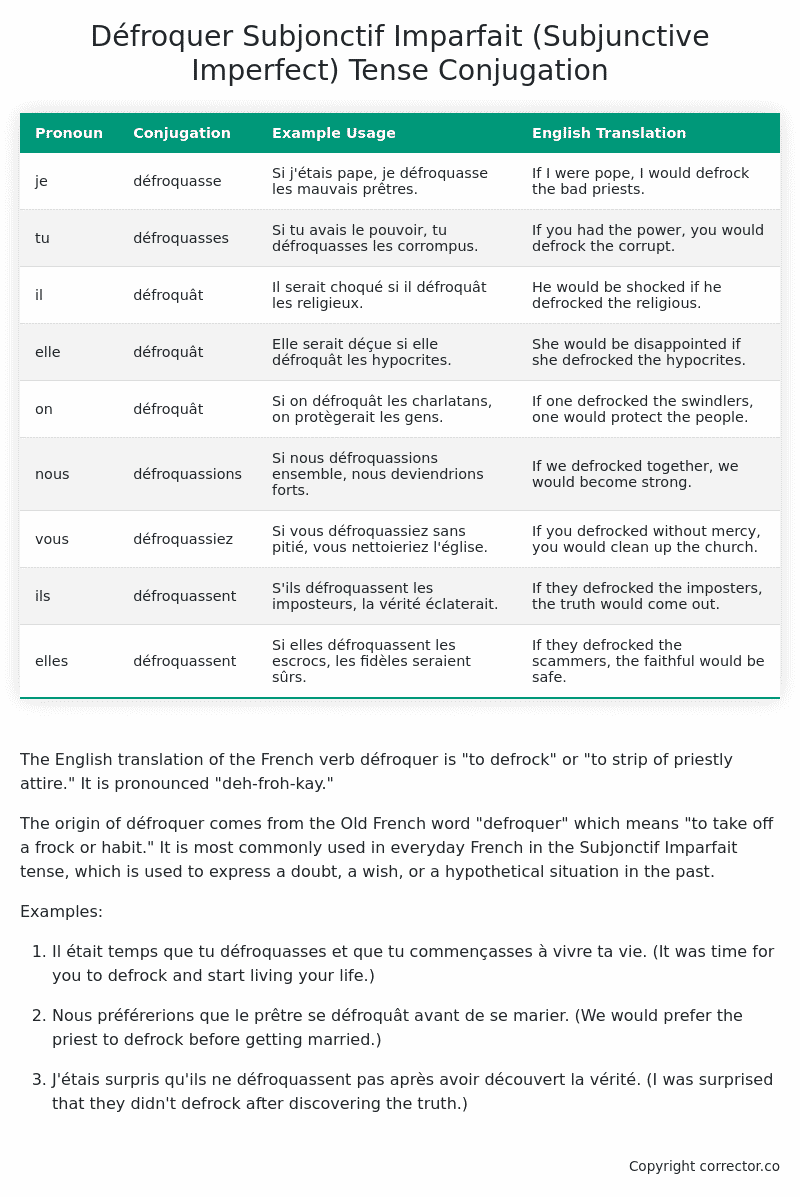Subjonctif Imparfait (Subjunctive Imperfect) Tense Conjugation of the French Verb défroquer
Introduction to the verb défroquer
The English translation of the French verb défroquer is “to defrock” or “to strip of priestly attire.” It is pronounced “deh-froh-kay.”
The origin of défroquer comes from the Old French word “defroquer” which means “to take off a frock or habit.” It is most commonly used in everyday French in the Subjonctif Imparfait tense, which is used to express a doubt, a wish, or a hypothetical situation in the past.
Examples:
-
Il était temps que tu défroquasses et que tu commençasses à vivre ta vie. (It was time for you to defrock and start living your life.)
-
Nous préférerions que le prêtre se défroquât avant de se marier. (We would prefer the priest to defrock before getting married.)
-
J’étais surpris qu’ils ne défroquassent pas après avoir découvert la vérité. (I was surprised that they didn’t defrock after discovering the truth.)
Table of the Subjonctif Imparfait (Subjunctive Imperfect) Tense Conjugation of défroquer
| Pronoun | Conjugation | Example Usage | English Translation |
|---|---|---|---|
| je | défroquasse | Si j’étais pape, je défroquasse les mauvais prêtres. | If I were pope, I would defrock the bad priests. |
| tu | défroquasses | Si tu avais le pouvoir, tu défroquasses les corrompus. | If you had the power, you would defrock the corrupt. |
| il | défroquât | Il serait choqué si il défroquât les religieux. | He would be shocked if he defrocked the religious. |
| elle | défroquât | Elle serait déçue si elle défroquât les hypocrites. | She would be disappointed if she defrocked the hypocrites. |
| on | défroquât | Si on défroquât les charlatans, on protègerait les gens. | If one defrocked the swindlers, one would protect the people. |
| nous | défroquassions | Si nous défroquassions ensemble, nous deviendrions forts. | If we defrocked together, we would become strong. |
| vous | défroquassiez | Si vous défroquassiez sans pitié, vous nettoieriez l’église. | If you defrocked without mercy, you would clean up the church. |
| ils | défroquassent | S’ils défroquassent les imposteurs, la vérité éclaterait. | If they defrocked the imposters, the truth would come out. |
| elles | défroquassent | Si elles défroquassent les escrocs, les fidèles seraient sûrs. | If they defrocked the scammers, the faithful would be safe. |
Other Conjugations for Défroquer.
Le Present (Present Tense) Conjugation of the French Verb défroquer
Imparfait (Imperfect) Tense Conjugation of the French Verb défroquer
Passé Simple (Simple Past) Tense Conjugation of the French Verb défroquer
Passé Composé (Present Perfect) Tense Conjugation of the French Verb défroquer
Futur Simple (Simple Future) Tense Conjugation of the French Verb défroquer
Futur Proche (Near Future) Tense Conjugation of the French Verb défroquer
Plus-que-parfait (Pluperfect) Tense Conjugation of the French Verb défroquer
Passé Antérieur (Past Anterior) Tense Conjugation of the French Verb défroquer
Futur Antérieur (Future Anterior) Tense Conjugation of the French Verb défroquer
Subjonctif Présent (Subjunctive Present) Tense Conjugation of the French Verb défroquer
Subjonctif Passé (Subjunctive Past) Tense Conjugation of the French Verb défroquer
Subjonctif Imparfait (Subjunctive Imperfect) Tense Conjugation of the French Verb défroquer (this article)
Subjonctif Plus-que-parfait (Subjunctive Pluperfect) Tense Conjugation of the French Verb défroquer
Conditionnel Présent (Conditional Present) Tense Conjugation of the French Verb défroquer
Conditionnel Passé (Conditional Past) Tense Conjugation of the French Verb défroquer
L’impératif Présent (Imperative Present) Tense Conjugation of the French Verb défroquer
L’infinitif Présent (Infinitive Present) Tense Conjugation of the French Verb défroquer
Struggling with French verbs or the language in general? Why not use our free French Grammar Checker – no registration required!
Get a FREE Download Study Sheet of this Conjugation 🔥
Simply right click the image below, click “save image” and get your free reference for the défroquer Subjonctif Imparfait tense conjugation!

Défroquer – About the French Subjonctif Imparfait (Subjunctive Imperfect) Tense
Formation
Common Everyday Usage Patterns
Interactions with Other Tenses
Subjonctif Présent
Indicatif Passé Composé
Conditional
Conditional Perfect
Summary
I hope you enjoyed this article on the verb défroquer. Still in a learning mood? Check out another TOTALLY random French verb conjugation!


